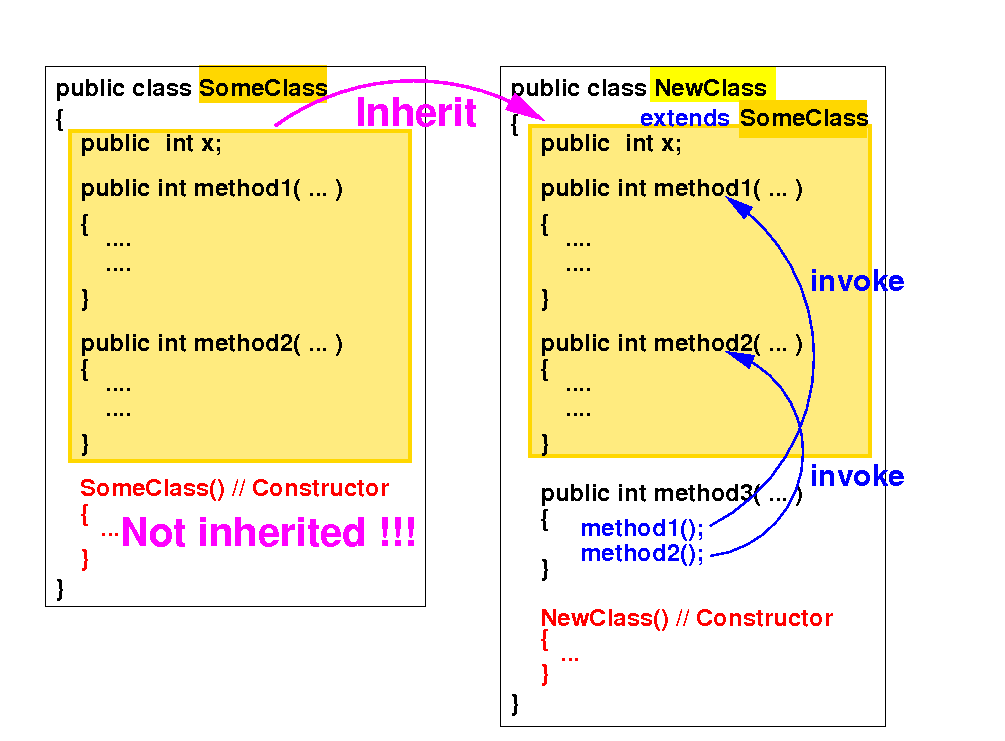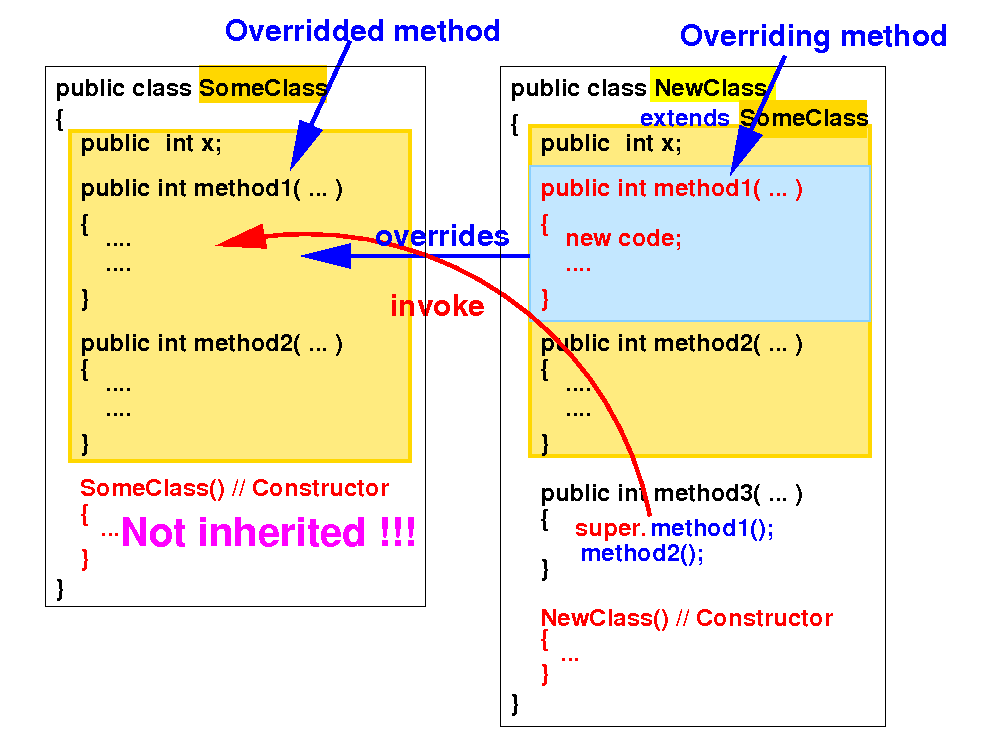The NewClass inherits (= receives) all normal members from its superclass:

All inherited members are now defined inside NewClass and you can use the public members directly
When you override an inherited method, a method call will invoke the overriding method by default:

Note: overriding an inherited method does not change the method inside the super class !
You can invoke an overridden method from within a subclass method using super.methodName(...)

Important note: there are situations where you must use an overridden method --- next !
Consider the basic BankAccount class to store information on bank accounts:
public class SavingsAccount
extends BankAccount
{
private final static int MAXNUMFREE = 3;
private final static double PENALTY = 1.0;
private int numWithdrawals;
public SavingsAccount(double x)
{
super(x);
}
public void withdraw(double amount)
{
super.withdraw(amount);
numWithdrawals++;
if ( numWithdrawals > MAXNUMFREE )
super.withdraw(PENALTY);
}
public void monthlyReset()
{
numWithdrawals = 0;
}
}
|
public class BankAccount
{
private double balance;
public BankAccount(double x)
{
balance = x;
}
public double getBalance()
{
return balance;
}
public void deposit(double amount)
{
balance = balance + amount;
}
public void withdraw(double amount)
{
balance = balance - amount;
}
}
|
The BankAccount support the basic operations: getBalance(), deposit() and withdraw()
The bank also has a special SavingsAccount specially for people who want to save money:
public class SavingsAccount
extends BankAccount
{
private double interestRate = 0.05;
private final static int MAXNUMFREE = 3;
private final static double PENALTY = 1.0;
private int numWithdrawals;
public SavingsAccount(double x)
{
super(x);
}
public void withdraw(double amount)
{
super.withdraw(amount);
numWithdrawals++;
if ( numWithdrawals > MAXNUMFREE )
super.withdraw(PENALTY);
}
public void addInterest()
{
balance += interestRate/12*balance; ???
}
}
|
public class BankAccount
{
private double balance;
public BankAccount(double x)
{
balance = x;
}
public double getBalance()
{
return balance;
}
public void deposit(double amount)
{
balance = balance + amount;
}
public void withdraw(double amount)
{
balance = balance - amount;
}
}
|
The addInterest() method is used to accrue interest to a SavingAccount.... do you see any problem ???
The balance member variable is private, so code written in SavingAccount class can not access it:
public class SavingsAccount
extends BankAccount
{
private double interestRate = 0.05;
private final static int MAXNUMFREE = 3;
private final static double PENALTY = 1.0;
private int numWithdrawals;
public SavingsAccount(double x)
{
super(x);
}
public void withdraw(double amount)
{
super.withdraw(amount);
numWithdrawals++;
if ( numWithdrawals > MAXNUMFREE )
super.withdraw(PENALTY);
}
public void addInterest()
{
balance += interestRate/12*balance; ???
} private private
}
|
public class BankAccount
{
private double balance;
public BankAccount(double x)
{
balance = x;
}
public double getBalance()
{
return balance;
}
public void deposit(double amount)
{
balance = balance + amount;
}
public void withdraw(double amount)
{
balance = balance - amount;
}
}
|
Question: how can we add the interest to a SavingAccount ??
We can use getBalance() and deposit(...) to add the accrued interest to a SavingAccount:
public class SavingsAccount
extends BankAccount
{
private double interestRate = 0.05;
private final static int MAXNUMFREE = 3;
private final static double PENALTY = 1.0;
private int numWithdrawals;
public SavingsAccount(double x)
{
super(x);
}
public void withdraw(double amount)
{
super.withdraw(amount);
numWithdrawals++;
if ( numWithdrawals > MAXNUMFREE )
super.withdraw(PENALTY);
}
public void addInterest()
{
deposit(interestRate/12*getBalance());
}
}
|
public class BankAccount
{
private double balance;
public BankAccount(double x)
{
balance = x;
}
public double getBalance()
{
return balance;
}
public void deposit(double amount)
{
balance = balance + amount;
}
public void withdraw(double amount)
{
balance = balance - amount;
}
}
|
Note: deposit( ) and getBalance( ) are not overridden and can access private members in BankAccount
The bank discourage frequent withdrawal from a SavingsAccount and will allow 3 free withdrawals per month:
public class SavingsAccount
extends BankAccount
{
private double interestRate = 0.05;
private final static int MAXNUMFREE = 3;
private final static double PENALTY = 1.0;
private int numWithdrawals;
public SavingsAccount(double x)
{
super(x);
}
// Reset # withdrawal at end of month
public void resetWithdrawals()
{
numWithdrawals = 0;
}
I will omit this method
to make space...
public void addInterest()
{
deposit(interestRate/12*getBalance());
}
}
|
public class BankAccount
{
private double balance;
public BankAccount(double x)
{
balance = x;
}
public double getBalance()
{
return balance;
}
public void deposit(double amount)
{
balance = balance + amount;
}
public void withdraw(double amount)
{
balance = balance - amount;
}
}
|
After the 3 free withdrawals, each additional withdrawal will incur a $1.00 penalty
The inherited withdraw( ) method does not penalize and is inadequate and must be overridded:
public class SavingsAccount
extends BankAccount
{
private double interestRate = 0.05;
private final static int MAXNUMFREE = 3;
private final static double PENALTY = 1.0;
private int numWithdrawals;
public SavingsAccount(double x)
{
super(x);
}
public void withdraw(double amount)
{
super.withdraw(amount);
numWithdrawals++;
if ( numWithdrawals > MAXNUMFREE )
super.withdraw(PENALTY);
}
public void addInterest()
{
deposit(interestRate/12*getBalance());
}
}
|
public class BankAccount
{
private double balance;
public BankAccount(double x)
{
balance = x;
}
public double getBalance()
{
return balance;
}
public void deposit(double amount)
{
balance = balance + amount;
}
public void withdraw(double amount)
{
balance = balance - amount;
}
}
|
Comment: I will access the balance variable directly - we will fix it later
When we withdraw from a SavingsAccount, we first perform the withdrawal:
public class SavingsAccount
extends BankAccount
{
private double interestRate = 0.05;
private final static int MAXNUMFREE = 3;
private final static double PENALTY = 1.0;
private int numWithdrawals;
public SavingsAccount(double x)
{
super(x);
}
public void withdraw(double amount)
{
balance = balance - amount;
numWithdrawals++;
if ( numWithdrawals > MAXNUMFREE )
super.withdraw(PENALTY);
}
public void addInterest()
{
deposit(interestRate/12*getBalance());
}
}
|
public class BankAccount
{
private double balance;
public BankAccount(double x)
{
balance = x;
}
public double getBalance()
{
return balance;
}
public void deposit(double amount)
{
balance = balance + amount;
}
public void withdraw(double amount)
{
balance = balance - amount;
}
}
|
Next, we must keep track of the number of withdrawals made...
We use the variable numWithdrawals to keep track of the number of withdrawals made:
public class SavingsAccount
extends BankAccount
{
private double interestRate = 0.05;
private final static int MAXNUMFREE = 3;
private final static double PENALTY = 1.0;
private int numWithdrawals;
public SavingsAccount(double x)
{
super(x);
}
public void withdraw(double amount)
{
balance = balance - amount;
numWithdrawals++;
if ( numWithdrawals > MAXNUMFREE )
super.withdraw(PENALTY);
}
public void addInterest()
{
deposit(interestRate/12*getBalance());
}
}
|
public class BankAccount
{
private double balance;
public BankAccount(double x)
{
balance = x;
}
public double getBalance()
{
return balance;
}
public void deposit(double amount)
{
balance = balance + amount;
}
public void withdraw(double amount)
{
balance = balance - amount;
}
}
|
Finally, we check for penalties...
We deduct PENALTY when the number of withdrawals exceeds the # free withdrawals:
public class SavingsAccount
extends BankAccount
{
private double interestRate = 0.05;
private final static int MAXNUMFREE = 3;
private final static double PENALTY = 1.0;
private int numWithdrawals;
public SavingsAccount(double x)
{
super(x);
}
public void withdraw(double amount)
{
balance = balance - amount;
numWithdrawals++;
if ( numWithdrawals > MAXNUMFREE )
balance -= PENALTY; // penalty
}
public void addInterest()
{
deposit(interestRate/12*getBalance());
}
}
|
public class BankAccount
{
private double balance;
public BankAccount(double x)
{
balance = x;
}
public double getBalance()
{
return balance;
}
public void deposit(double amount)
{
balance = balance + amount;
}
public void withdraw(double amount)
{
balance = balance - amount;
}
}
|
Question: how can we subtract from the private variable balance ???
We must use the withdraw( ) method inside the super class (i.e." super.withdraw( ) ):
public class SavingsAccount
extends BankAccount
{
private double interestRate = 0.05;
private final static int MAXNUMFREE = 3;
private final static double PENALTY = 1.0;
private int numWithdrawals;
public SavingsAccount(double x)
{
super(x);
}
public void withdraw(double amount)
{
super.withdraw(amount);
numWithdrawals++;
if ( numWithdrawals > MAXNUMFREE )
super.withdraw(PENALTY); // penalty
}
public void addInterest()
{
deposit(interestRate/12*getBalance());
}
}
|
public class BankAccount
{
private double balance;
public BankAccount(double x)
{
balance = x;
}
public double getBalance()
{
return balance;
}
public void deposit(double amount)
{
balance = balance + amount;
}
public void withdraw(double amount)
{
balance = balance - amount;
}
}
|
I have a test program in the next slide (and a demo....)
public class myProg
{
public static void main(String[] args)
{
SavingsAccount a = new SavingsAccount(100);
a.withdraw(10);
System.out.println(a.getBalance()); // 90
a.withdraw(10);
System.out.println(a.getBalance()); // 80
a.withdraw(10);
System.out.println(a.getBalance()); // 70
a.withdraw(10);
System.out.println(a.getBalance()); // 59 ! ($1 penalty)
}
}
|
DEMO: 04-inheritance/10-saving
What will happen if we did not use super to invoke withdraw( ):
public class SavingsAccount
extends BankAccount
{
private double interestRate = 0.05;
private final static int MAXNUMFREE = 3;
private final static double PENALTY = 1.0;
private int numWithdrawals;
public SavingsAccount(double x)
{
super(x);
}
public void withdraw(double amount)
{
|
public class BankAccount
{
private double balance;
public BankAccount(double x)
{
balance = x;
}
public double getBalance()
{
return balance;
}
public void deposit(double amount)
{
balance = balance + amount;
}
public void withdraw(double amount)
{
balance = balance - amount;
}
}
|
The withdraw method is recursive and will crash:
public class SavingsAccount
extends BankAccount
{
private double interestRate = 0.05;
private final static int MAXNUMFREE = 3;
private final static double PENALTY = 1.0;
private int numWithdrawals;
public SavingsAccount(double x)
{
super(x);
}
public void withdraw(double amount)
{
withdraw(amount); // Recursion !
numWithdrawals++;
if ( numWithdrawals > MAXNUMFREE )
withdraw(PENALTY); // penalty
}
public void addInterest()
{
deposit(interestRate/12*getBalance());
}
}
|
public class BankAccount
{
private double balance;
public BankAccount(double x)
{
balance = x;
}
public double getBalance()
{
return balance;
}
public void deposit(double amount)
{
balance = balance + amount;
}
public void withdraw(double amount)
{
balance = balance - amount;
}
}
|
Use: 04-inheritance/10-saving to demo...